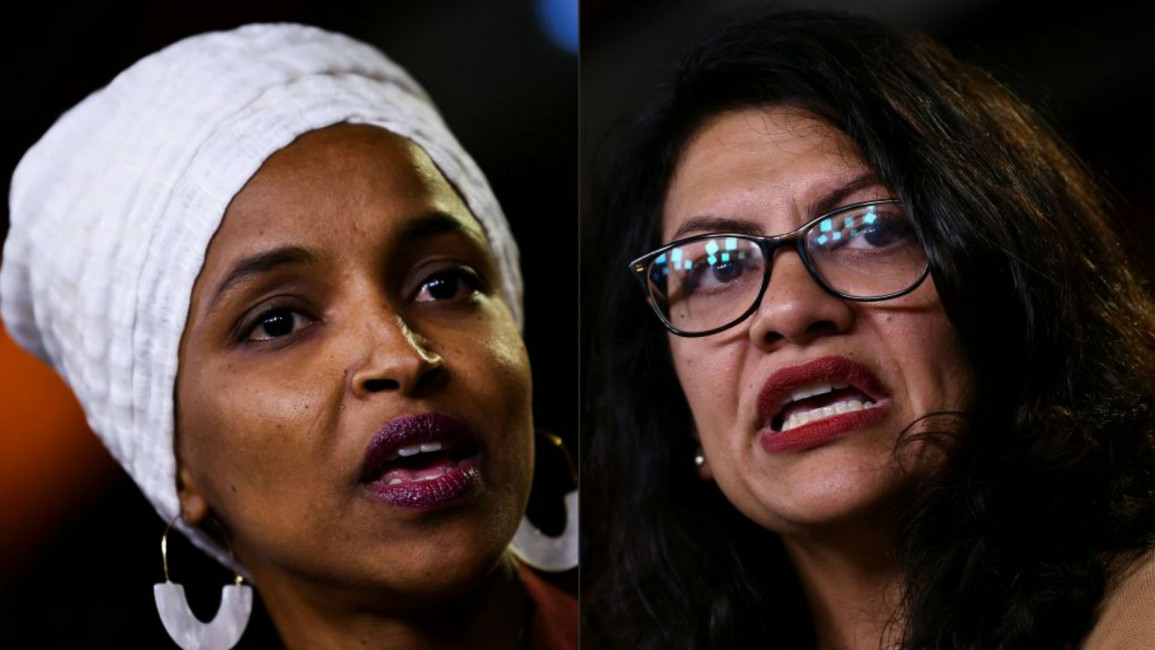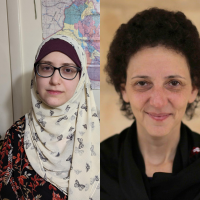
Israel's Tlaib-Omar ban enacts a signature practice of non-democratic states
But when Netanyahu denied entry to US Congresswomen Rashida Tlaib and Ilhan Omar, Israel demonstrated it had much in common with some of its more autocratic Arab neighbours.
Foreign journalists, advocates, and academics critical of Middle Eastern state practices are frequently denied entry on purported national security grounds. For natives, their dissent often lands them in jail. Such quashing of dissent reflects a crisis of political legitimacy - something Israel is increasingly experiencing on the global stage.
That the American Israeli Political Action Committee, arguably the most pro-Israeli organisation in the US, condemned Netanyahu's decision is further evidence that Israel's authoritarian practices are expanding rapidly.
For Palestinians, abusive state practices are the norm. Those who fly into Ben Gurion airport or cross from Jordan on the Allenby bridge spend hours detained, strip searched, and questioned about their views on Israel. Palestinians with political views deemed unacceptable by Israel's border security are denied entry.
Ideologically-based exclusions extend to Jewish Americans critical of Israeli state practices. In 2010, public intellectual Noam Chomsky was denied entry for a lecture he was scheduled to give at Bir Zeit University in the West Bank.
Last year, national co-director of CODEPINK Ariel Gold and executive director of Jewish Voice For Peace Rebecca Vilkomerson were placed on No Entry blacklists. Prominent journalist Peter Beinhart, though ultimately allowed in, was also detained and interrogated on his activism in defense of Palestinian human rights.
Israel's suppression of freedom of expression is facilitated by a 2017 amendment to "Entry Into Israel Law." The law prohibits entry of foreign nationals who publicly call for or participate in boycotting Israel or any area under its control, including the occupied West Bank and Gaza.
 |
Netanyahu's decision is further evidence that Israel's authoritarian practices are expanding rapidly |  |
As a result, Israel imposes a political litmus test as a condition for entering the country - a signature practice of non-democratic states.
Israeli government officials claim the law protects national security by keeping out people who seek to harm or delegitimise the state. Specifically, the law targets members of the Boycott, Divestment, and Sanctions (BDS) movement, which is gaining followers across western countries.
Netanyahu's decision to bar Representatives Tlaib and Omar (both supporters of BDS), thus, is not an unprecedented move. Rather, it brings to light the fallacy of Israel's claims of moral superiority over its authoritarian Arab neighbours.
Twitter Post
|
Like other Middle East regimes, Israel deploys national security as a cover for punishing critics, covering up oppressive state practices, and denying its citizens exposure to dissenting views.
For example, the United Arab Emirates (UAE) in 2015n refused entry to New York University professor Andrew Ross because of his criticism of the UAE's mistreatment of migrant labourers.
Ross was among other members of the Gulf Labor Artist Coalition, an international group of artists defending migrant workers' rights during the construction of museums in the UAE. A year earlier in 2014, the Middle East and North Africa Director of Human Rights Watch (HRW), Sarah Leah Wilson, was denied entry to Dubai on account of HRW's criticism of the country's human rights record.
Neighbouring country and UAE ally, Bahrain, denied entry to over 200 foreign journalists, NGO members, politicians, trade unionists, aid workers and activists between 2011 and 2012. The following year, in 2013, the UAE denied entry to a professor from a top British university whose academic writings were critical of the Bahraini monarchy.
Similarly, Egypt has been denying entry to foreign critics since the military ousted former President Mohamed Morsi from power in 2013.
The Association for Freedom of Thought and Expression's report Entry Banned: On Banning Entry of Foreign Researchers and Academics to Egypt describes numerous cases including Sarah Leah Wilson and Kenneth Roth at HRW as well as Michele Dunne of the Carnegie Endowment for International Peace - who all described the forced removal and imprisonment of Morsi as a military coup.
Most recently in February of this year, New York Times reporter David Kirkpatrick was denied entry soon after he published the book Into the Hands of the Soldiers: Freedom and Chaos in Egypt and the Middle East.
Although Israel's refusal to allow in Tlaib and Omar was not exceptional, one key factor stands out—these women are elected officials in the United States Congress.
 |
Similarly, Egypt has been denying entry to foreign critics since the military ousted former President Mohamed Morsi from power in 2013 |  |
A Middle Eastern ally, much less one that has received over $130 billion in US aid, excluding US elected officials is unprecedented. The ideologically-based bans of Omar and Tlaib denies the US government oversight over taxpayer expenditures. This includes ensuring Israel complies with US human rights conditions on foreign aid.
Put simply, excluding US Representatives Omar and Tlaib impedes the oversight and transparency integral to the US' democratic system.
Defenders of Netanyahu's decision (including President Trump) are correct that Israel can exercise its rights of sovereignty to exclude foreigners. But when it does so on account of political speech and expression, Israel can no longer stand by its fallacious claims of being democratic.
Sahar Aziz is Professor and Chancellor's Social Justice Scholar at Rutgers University Law School. She also serves as the founding Director of the Rutgers Center for Security, Race and Rights.
Follow her on Twitter: @saharazizlaw
Opinions expressed in this article remain those of the author and do not necessarily represent those of The New Arab, its editorial board or staff.




